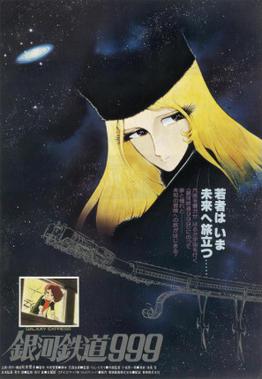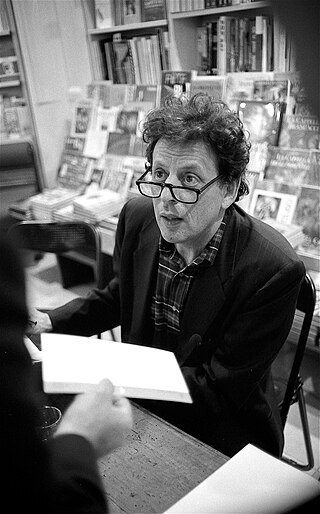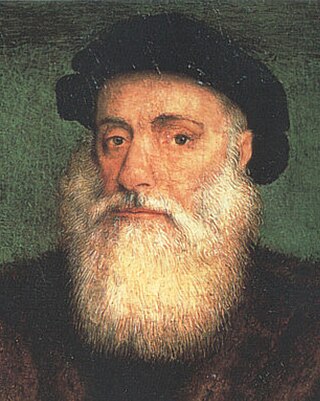
Christopher Columbus was an Italian explorer and navigator from the Republic of Genoa who completed four Spanish-based voyages across the Atlantic Ocean sponsored by the Catholic Monarchs, opening the way for the widespread European exploration and European colonization of the Americas. His expeditions were the first known European contact with the Caribbean and Central and South America.

L'italiana in Algeri is an operatic dramma giocoso in two acts by Gioachino Rossini to an Italian libretto by Angelo Anelli, based on his earlier text set by Luigi Mosca. It premiered at the Teatro San Benedetto in Venice on 22 May 1813. The music is characteristic of Rossini's style, remarkable for its fusion of sustained, manic energy with elegant, pristine melodies.

Singularity Sky is a science fiction novel by British writer Charles Stross, published in 2003. It was nominated for the Hugo Award for Best Novel in 2004. A sequel, Iron Sunrise, was published that same year. Together the two are referred to as the Eschaton novels, after a near-godlike intelligence that exists in both.

Das Liebesverbot, is an early comic opera in two acts by Richard Wagner, with the libretto written by the composer after Shakespeare's Measure for Measure. Described as a Große komische Oper, it was composed in early 1836.

Galileo Galilei is an opera based on excerpts from the life of Galileo Galilei, which premiered in 2002 at Chicago's Goodman Theatre, as well as subsequent presentations at the Brooklyn Academy of Music's New Wave Music Festival and London's Barbican Theatre. Music by Philip Glass, libretto and original direction by Mary Zimmerman and Arnold Weinstein. The piece is presented in one act consisting of ten scenes without break.

A Voyage to Arcturus is a novel by the Scottish writer David Lindsay, first published in 1920. An interstellar voyage is the framework for a narrative of a journey through fantastic landscapes. The story is set at Tormance, an imaginary planet orbiting Arcturus, which in the novel is a binary star system, consisting of the stars Branchspell and Alppain. The lands through which the characters travel represent philosophical systems or states of mind as the main character, Maskull, searches for the meaning of life. The book combines fantasy, philosophy, and science fiction in an exploration of the nature of good and evil and their relationship with existence. Described by critic, novelist, and philosopher Colin Wilson as the "greatest novel of the twentieth century", it was a central influence on C. S. Lewis' Space Trilogy, and through him on J. R. R. Tolkien, who said he read the book "with avidity". Clive Barker called it "a masterpiece" and "an extraordinary work ... quite magnificent".

Doraemon: Nobita Drifts in the Universe is the 1999 Japanese animated epic space opera film. It is the second Doraemon film released after Hiroshi Fujimoto's departure, based on the 19 volume of the same name of the Doraemon Long Stories series. This is the third movie solely produced by Fujiko Production following The Record of Nobita's Parallel Visit to the West (1988) and Nobita's Great Adventure in the South Seas (1998). This movie commemorates the 20th anniversary of the Doraemon film series. It was released on March 6, 1999, together with Doraemon: Nobita's the Night Before a Wedding and Funny Candy of Okashinana!?. It is the 20th Doraemon film.

Between 1492 and 1504, Italian explorer Christopher Columbus, under the Catholic Monarchs of Spain, led four Spanish transatlantic maritime expeditions of discovery to the Caribbean, and to Central and South America. These voyages led to the widespread knowledge of the New World. This breakthrough inaugurated the period known as the Age of Discovery, which saw the colonization of the Americas, a related biological exchange, and trans-Atlantic trade. These events, the effects and consequences of which persist to the present, are often cited as the beginning of the modern era.

Le voyage dans la Lune is an 1875 opéra-féerie in four acts and 23 scenes by Jacques Offenbach. Loosely based on the 1865 novel From the Earth to the Moon by Jules Verne, its French libretto was by Albert Vanloo, Eugène Leterrier and Arnold Mortier. This was another prolific year for the composer, that included also the third version of Geneviève de Brabant, Les hannetons, La boulangère a des écus, La créole and a waltz for Tarte à la crême.

Cristoforo Colombo is an opera in four acts and an epilogue by Alberto Franchetti to an Italian libretto by Luigi Illica. It was written in 1892 to commemorate the 400th anniversary of Christopher Columbus' arrival in America.

The Magic Voyage is a 1992 German animated fantasy film produced and directed by Michael Schoemann. It was released in Germany by Atlas Film on 14 February 1992. The film was later dubbed in English and released in the United States and Canada: two English dubs were actually produced. The first one was a rare English dub released by Atlas Film, while the second English dub was produced by Hemdale Film Corporation, released as The Magic Voyage on 23 April 1993 with a new and more well-known voice cast. The latter dub had a different music soundtrack, and both English dubs had different translations.

La statue is an opera in three acts and five tableaux by Ernest Reyer to the libretto by Michel Carré and Jules Barbier based on tales from One Thousand and One Nights and La statue merveilleuse, an 1810 carnival play by Alain-René Lesage and Jacques-Philippe d'Orneval.

Galaxy Express 999 is a 1979 Japanese animated science fiction film directed by Rintaro, based on the manga and anime television series of the same name originally created by Leiji Matsumoto.

Paradises Lost is a science fiction novella by American author Ursula K. Le Guin. It was first published in 2002 as a part of the collection The Birthday of the World. It is set during a multigenerational voyage from Earth to a potentially habitable planet. The protagonists, Liu Hsing and Nova Luis, are members of the fifth generation born on the ship. The story follows them as they deal with members of religious cult who do not believe in the ship stopping at its intended destination. They also face a crisis brought on by a drastic change in the ship's schedule. The novella has since been anthologized as well as adapted into an opera of the same name.

Captain Harlock: Dimensional Voyage is a manga series written by Leiji Matsumoto and illustrated by Kōichi Shimahoshi. It was the final manga by Leiji Matsumoto before his death in February 2023.

La Belle et la Bête is an opera for ensemble and film, composed in 1994 by Philip Glass based on a libretto in French by the composer according to the script of the film by Jean Cocteau released in 1946. This is the second part of a trilogy in homage to the French poet after Orphée (1993) and before Les Enfants terribles (1996). The world premiere of the work took place on 4 June 1994 in Seville, with Michael Riesman conducting.
The Trials of Galileo is an opera-oratorio, copyrighted in 1967, with libretto in English by Joe Darion and music by Ezra Laderman. Commissioned by Pamela Illott, Executive Producer of Cultural Programming of the CBS Television Network, and first performed on that network in May, 1967 under the title The Trials of Galileo. It was modified for staged performance under the new title, Galileo Galilei, performed by the Tri-Cities Opera in cooperation with the State University of New York at Binghamton, on February 3, 1979.

White Raven is an opera in five acts and three knee plays, for soloists, choir and orchestra, composed in 1991 by Philip Glass in collaboration with Robert Wilson, with libretto by Luísa Costa Gomes. Commissioned by the National Commission for the Commemoration of the Portuguese Discoveries in the Teatro Real in Madrid, the world premiere of the work took place on the occasion of the International Exhibition, 26 September 1998 in the Teatro Camões in Lisbon, directed by Dennis Russell Davies. The Spanish premiere, under the direction of Günter Neuhold took place on the 28 November 1998 and the American premiere at Lincoln Center, in New York, directed by Dennis Russell Davies and with choreography by Lucinda Childs, 10 July 2001.

















